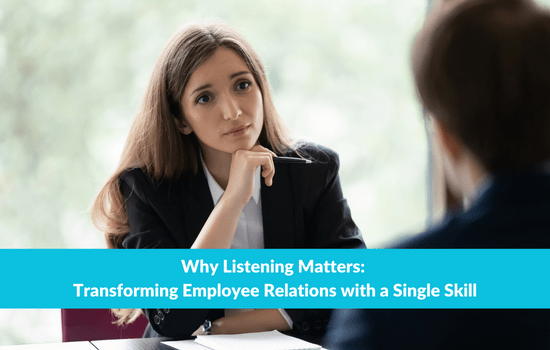Being an effective listener is one of the most important skills you can possess. Fostering an organization's active listening skills can lead to stronger relationships, improved teamwork and employee relations, and higher employee satisfaction and productivity levels.
Listening is the Secret Ingredient to Positive Employee Relations
When you review these statistics, you may be surprised to learn how the spoken message is communicated. Believe it or not, only 7% of what we convey is by words, with 38% indicated by the tone of voice. Finally, we transmit 55% of the meaning non-verbally. * Source: Mehrabian, 1981

Are You Listening or Multi-tasking?
Our world seems to thrive on multi-tasking now more than ever, which affects our focus. Consequently, the art of listening is a skill that becomes a challenge.
When we multi-task, we focus on more than one thing simultaneously, fragmenting our focus and negatively affecting our listening skills. It's easy to forget how critical active listening is and precisely what we need to do to listen and get the whole picture.
How often have you been in a conversation when you or the other participant has lost focus and is simultaneously looking at their phone or working on something else? In casual conversations, you can often get away with this. But when it comes to employee relations, the effects can be particularly challenging, negatively affecting relationships.
It's easy to forget how critical active listening is and precisely what we need to do to listen and get the whole picture. But if we don't take the time to learn to listen and then put those skills to use, employee relations will suffer from the get-go.
We Need to Hear What is Being and Isn’t Being Said.
We must fully engage and actively listen if we only convey 7% of our verbalizations to others. Listening is much more than just hearing spoken words. It's about focusing on the person speaking.
Have you ever been part of a conversation where the other person waits for their turn to speak rather than genuinely listening? Or maybe you've been guilty of that (most of us have). Even though the other person may carry on talking, it doesn't mean they don't pick up on your lack of attention and focus on what they have to say.
Can you imagine how damaging this can be for employee relations? Or relationships of all kinds, for that matter.
Be careful not to prepare your answer when someone is talking. Instead, actively listen, and stay in the moment by practising mindfulness. Pay attention to the speed, volume, and voice tone. So often, messages live below the surface and aren't evident unless we pay close attention.
How Listening Impacts Business And Employee Relations.
When coaching, I find poor listening causes the most significant challenges. Employees who misinterpret the message may feel offended and often take it personally. Or, perhaps even worse, they may disengage entirely. Ultimately, this negatively impacts employee relations and overall productivity.
One who is focused and actively listens asks appropriate questions to seek clarification and information when they don't fully comprehend the speaker's words. I've seen the direct correlation between listening and employee relations through consulting.
The bottom line is poor listening skills threaten teamwork and relationships. Here's the thing: you can develop the art of listening or enhance your listening skills through practice. It's a skill you can focus on and grow like any other.
And why not take the time to do this? After all, you'll benefit tremendously the more you focus on building your listening skills. And it won't only be you who benefits from listening. Personal and employee relations improve almost instantly just by taking the time to listen.
Active Listening Can Significantly Improve Employee Relations
Here are several significant ways to improve active listening:
- Employees build trust when they feel heard and understood; it fosters trust between them and their managers or colleagues, leading to a more positive and open working environment.
- Active listening enhances communication and helps employees feel comfortable expressing their ideas, concerns, and suggestions, leading to better communication and teamwork.
- Listening carefully to employees' perspectives during conflicts or disagreements helps managers identify the root cause and find more effective resolutions.
- When employees know their opinions matter, they are more likely to be engaged with their work and the organization.
- By actively listening to employees, managers can detect potential problems or dissatisfaction early on and take proactive measures to address them.
- Employees who feel listened to are generally more satisfied with their jobs and the organization, leading to increased retention rates.
- Feeling valued and acknowledged for their contributions can boost employees' morale, leading to higher productivity and overall job satisfaction.
- Listening to diverse ideas and perspectives can foster a culture of innovation, as employees feel encouraged to share their unique insights and suggestions.
- Active listening enables managers to understand employees' career aspirations and offer tailored development opportunities, increasing their motivation and loyalty.
- Demonstrating empathy through active listening shows employees that their well-being and concerns are genuinely valued, creating a more compassionate work environment.
Relationships transform when we recognize the importance of active listening and how it improves employee relations and teamwork. To learn more about leading effectively, look at this next workshop: Leading With Emotional Effectiveness. Did you enjoy this blog? Here are three more just for you:
How to Successfully Retain a High Performing Team »
Five Powerful Ways to Demonstrate Employee Appreciation »
How To Motivate Employees to Be Their Best »
This article was originally published on April 14, 2017, and has been updated (August 2023).
More Motivational Reads Here »
How Emotionally Intelligent Are You?
Sign up for Linda's monthly tips to build your Emotional Intelligence and reduce Emotional Hijacking!

















